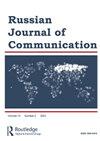The Tenth International Media Readings in Moscow: ‘Mass Media and Communications – 2018’
Q1 Social Sciences
引用次数: 0
Abstract
On 25 October 2018 the Faculty of Journalism, MSU held the 10th International Moscow Readings conference ‘Mass Media and Communications – 2018’. The overarching theme of the conference this year was ‘Digital Transformations of Mass Media: Regional, National and Global Aspects’. The conference was attended by 200 scholars from 30 countries around the world, who presented a fascinating variety of contemporary media studies. As in the previous years, the conference was organized with support from the Federal Agency for Press and Mass Communications of the Russian Federation. During opening ceremony, Dean of the Faculty of Journalism Professor Elena Vartanova mentioned that the conference has proved to be an efficient platform for establishing not only academic, but also friendly relations between media researchers from all over the world. She also presented an Award of Excellence to Professor Paolo Mancini (University of Perugia, Italy) as a sign of respect for his great academic achievements and as a sign of gratitude for more than 10 years of fruitful cooperation between the Faculty of Journalism, MSU and University of Perugia. The framework of the conference was outlined by the keynote speakers during two plenary sessions. A constellation of respected scholars included Professor Elena Vartanova (Lomonosov Moscow State University, Russia), Professor Paolo Mancini (University of Perugia, Italy), Professor Hannu Nieminen (University of Helsinki, Finland), Professor Philip Seib (University of Southern California, U.S.A.), Professor Andreas Hepp (University of Bremen, Germany), Professor Pal Tamas (Hungarian Academy of Sciences, Hungary) and Dr Massimo Ragnedda (Northumbria University, Great Britain). In their keynote addresses, speakers covered crucial issues of modern media studies like digital divide, informational rights, ‘echo chambers’ and informational ‘bubbles’ in the Internet, mediatization and robotization of social processes, etc. Professor Andreas Hepp focused in his speech on the phenomenon of deep mediatization as a social meta-process, which means that it is structured by humans and should be analyzed as such. Professor Hannu Nieminen mentioned that media today are central to democracy; but at the same time, they are part of the process of normalization of inequality. In the media, the growing gap between the haves and the have-nots is thus becoming a ‘new normal’. Professor Paolo Mancini argued in his presentation that the recent emergence of the so called ‘echo chamber’ phenomenon represents something new for the U.S.A., while many European democracies have witnessed for many years a sort of news media ‘affiliation consumption’ (selective exposure), very similar to the ‘echo-chamber’在莫斯科举行的第十届国际媒体读书会:“大众媒体与传播- 2018”
2018年10月25日,莫斯科国立大学新闻学院举行了第十届“大众媒体与传播- 2018”莫斯科国际阅读会议。今年会议的总体主题是“大众媒体的数字化转型:区域、国家和全球层面”。来自世界30个国家的200多名学者出席了此次会议,他们介绍了各种令人着迷的当代媒体研究。同前几年一样,这次会议是在俄罗斯联邦新闻和大众通讯局的支助下组织的。在开幕式上,新闻学院院长Elena Vartanova教授提到,这次会议已被证明是一个有效的平台,不仅可以建立学术关系,还可以建立来自世界各地的媒体研究人员之间的友好关系。她还向Paolo Mancini教授(意大利佩鲁贾大学)颁发了卓越奖,以表彰他在学术上取得的巨大成就,并对密歇根州立大学新闻学院与佩鲁贾大学十多年来卓有成效的合作表示感谢。在两次全体会议上,主要发言人概述了会议的框架。受人尊敬的学者包括Elena Vartanova教授(俄罗斯罗蒙诺索夫莫斯科国立大学)、Paolo Mancini教授(意大利佩鲁贾大学)、Hannu Nieminen教授(芬兰赫尔辛基大学)、Philip Seib教授(美国南加州大学)、Andreas Hepp教授(德国不来梅大学)、Pal Tamas教授(匈牙利科学院)和Massimo Ragnedda博士(英国诺森比亚大学)。在他们的主题演讲中,演讲者涵盖了现代媒体研究的关键问题,如数字鸿沟,信息权利,互联网中的“回声室”和信息“泡沫”,社会过程的媒体化和机器人化等。Andreas Hepp教授在演讲中重点讨论了作为社会元过程的深度媒介化现象,这意味着它是由人类构建的,应该被这样分析。Hannu Nieminen教授提到今天的媒体是民主的核心;但与此同时,它们也是不平等正常化进程的一部分。在媒体上,贫富之间日益扩大的差距正成为一种“新常态”。保罗·曼奇尼教授在他的演讲中指出,最近出现的所谓的“回音室”现象对美国来说是一种新的现象,而许多欧洲民主国家多年来已经见证了一种新闻媒体的“隶属消费”(选择性曝光),与“回音室”非常相似。
本文章由计算机程序翻译,如有差异,请以英文原文为准。
求助全文
约1分钟内获得全文
求助全文
来源期刊

Russian Journal of Communication
Social Sciences-Political Science and International Relations
自引率
0.00%
发文量
0
期刊介绍:
Russian Journal of Communication (RJC) is an international peer-reviewed academic publication devoted to studies of communication in, with, and about Russia and Russian-speaking communities around the world. RJC welcomes both humanistic and social scientific scholarly approaches to communication, which is broadly construed to include mediated information as well as face-to-face interactions. RJC seeks papers and book reviews on topics including philosophy of communication, traditional and new media, film, literature, rhetoric, journalism, information-communication technologies, cultural practices, organizational and group dynamics, interpersonal communication, communication in instructional contexts, advertising, public relations, political campaigns, legal proceedings, environmental and health matters, and communication policy.
 求助内容:
求助内容: 应助结果提醒方式:
应助结果提醒方式:


